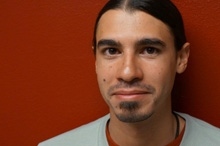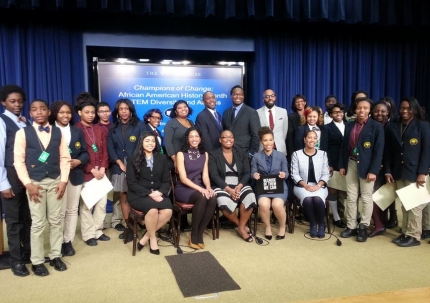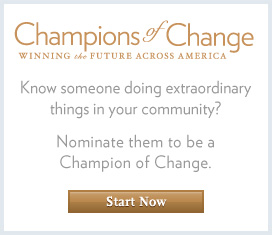Champions of Change Blog
Dream Big! Ensuring the Next Generation of Conservation Leaders Know How to Follow Their Hearts
Posted by on March 24, 2014 at 12:43 PM EDT
Stacie Gilmore is being honored as a Next Generation of Conservation Leaders Champion of Change.
I am humbled and honored to be selected as a Champion of Change for Engaging the Next Generation of Conservation Leaders. In 1996, I co-founded the nonprofit Environmental Learning for Kids (ELK) with the desire to educate Colorado’s underserved youth about the state’s natural resources and to empower them to pursue a science, conservation, or natural resources career. Through ELK, I work to inspire youth to have high expectations of themselves by exposing them to the outdoors and engaging them in service learning projects. Science and environmental education is embedded in all ELK’s programs and activities to further students’ understanding and attitudes toward science, the outdoors, their communities, college, and careers. I work to transform the lives of youth by endowing them with increased academic skills, civic and community leadership, environmental stewardship, and employment opportunities.
As we celebrate Environmental Learning for Kids’ 18th anniversary, I’m reminded to “Dream Big!”. To me, "Dreaming Big" means having a grand vision, optimism, and the belief that everything works out for the best.
When my husband Scott and I dreamed up ELK 18 years ago, we did it for children who didn’t have the opportunities to experience the outdoors at an early age or to explore careers in science and natural resources. We dreamed that through leadership and community environmental stewardship, youth and their families would develop strong ties to their neighborhoods. Dreaming is just the beginning. Then the hard work begins, and it never really ends. ELK is working towards acquiring 5.5 acres in our community; Montbello in Denver, CO, our neighborhood is adjacent to a former Superfund site, the Rocky Mountain Arsenal National Wildlife Refuge. Directing Natural Resource Damage Funds in support of this effort is an opportunity to take a step toward rectifying the environmental injustice that continues to reverberate today.
What really defines success for ELK? My definition of success for the past 18 years has simply been, “How has ELK impacted a child’s life?” Every action I take is a means to this end. Our children and their families are the most valued part of ELK’s success. ELK is about people; embracing individual talents and strengths, working together for a common goal, and sharing the hard work.
I continue to dream big and am grateful to have had the opportunity to surround myself with individuals who encourage me to make my dreams a reality. As ELK continues to grow, I look forward to our future challenges and successes. ELK belongs to the community and our youth — their commitment to our mission is what inspires me to continue working diligently to support their dreams. Everyone has the right to “Dream Big!”
Through ELK and our programs we are able to educate kids about how to make decisions and to listen to their inner voice about what is right or wrong for them. We encourage them to think for themselves, tell them that we trust them, and ensure that they will make good decisions in life. In the past three years, ELK kids have become more involved in advocating for full funding of the Land and Water Conservation Fund, through rafting down Browns Canyon in Colorado to visiting our Colorado delegation in DC. This involvement empowers them to share their voice, stories, and experiences to become the next generation of conservation leaders our country deserves.
Stacie Gilmore is the Executive Director and Co-Founder of Environmental Learning for Kids (ELK), a Colorado based nonprofit whose mission for the past 18 years has been to cultivate a passion for science, leadership, and service within a diverse community of learners.
Learn more aboutConservation Work: Revitalizing Our Ecosystem, Healing Our Community, Empowering Our People
Posted by on March 24, 2014 at 12:40 PM EDT
Anthony Ciocco is being honored as a Next Generation of Conservation Leaders Champion of Change.
Conservation corps: camping, hiking, sledgehammers, chainsaws, no showers, long and hard work days with little pay. It’s not a lifestyle that fits everyone. Imagine meeting a group of complete strangers, living together for 9 days at a time in the remote mountains or desert with no contact with the outside world. When it’s all over you’ll be a new person, you’ll have grown, and forged the type of deep meaningful relationships with others that can last a lifetime. That’s the real magic of conservation corps.
I came upon conservation corps somewhat by accident. I grew up loving the outdoors, but never foresaw it as a career. As a Mvskoke person deeply devoted to our traditional culture, I worked for years in various efforts to revitalize our language and traditional food systems. Overcoming generations of struggle to maintain our cultural heritage has been the most fulfilling part of my life. While I continue to passionately work in both of these fields, my motivation has evolved. I have found that real love for our community and youth means supporting them in their own endeavors. Conservation corps has offered me an ideal space for enacting this.
When I took up conservation corps work I did not realize how much it would impact the lives of my crew members, nor the impact our work would have on the environment. One of my crews worked throughout the hot Arizona summer installing induced meander structures to restore the healthy flow of a precious local stream. After 3 months of grueling labor the local wash was hit with a once-in-a-hundred-years flood wiping out most of the work we had done. We walked along the stream the following day in silence, not sure whether to cry, laugh, or just quit, assuming that all our labor was in vain. Just as all seemed lost, we noticed something was different. The flow of the stream had changed course in several areas. What the books said would take decades had just happened overnight. It had worked! The flood was a blessing, as if the stream had seen our efforts, called for rain, and utilized the surgically placed structures to flow healthy again. For the first time we saw deer tracks. The stream, the ecosystem, our faith in our efforts and in ourselves blossomed back to life.
Native Americans, as a group, rank the worst in virtually every social ill. Many crew members are high school drop outs, have endured years of child abuse, don’t know one or both of their parents, have seen a sibling or friend commit suicide, have overcome substance abuse, and very few have running water or electricity in their homes. While this could be a clichéd sob story, it doesn’t have to continue as such.
Despite the overwhelming hardships, we persist as a crew, we work, learn, and thrive. Conservation pay doesn’t lift individual members out of intergenerational poverty, it does something so much more valuable — it empowers them to lift themselves and to overcome any and every obstacle they set their minds to.
At its core, conservation work is about helping things grow. It’s an almost ridiculously simple — and simultaneously perfect — principle. The Southwest Conservation Corps Ancestral Lands Program heals our community in the broadest sense (our land base) and the most specific sense, through empowering individuals. While I have been labeled an activist, I didn’t initially consider conservation corps work to be a form of activism. However, I have found that it is perhaps the most radical form thereof, supporting and empowering our young people to fulfill their own destinies.
Anthony Ciocco, of the Mvskoke tribe, is a Crew Leader for the Southwest Conservation Corps, a 21CSC and AmeriCorps program of Conservation Legacy that is dedicated to empowering individuals to positively impact their lives, their communities and the environment. He graduated Summa Cum Laude with a Bachelor’s Degree in Ethnic Studies from University of Colorado at Boulder.
Learn more aboutNominate a White House Champion of Change for Expanding Reentry Employment Opportunities
Posted by on March 19, 2014 at 9:01 AM EDTStable employment – like stable housing, family and community support, and access to substance abuse and mental health treatment – is critical to the rehabilitation, stability and successful reentry of individuals who have been incarcerated and are returning to our communities. Research shows that those who have been employed even for a year or less are far less likely to commit another crime. That is why the innovative work of local and state community leaders to help those with criminal records re-enter society with dignity and viable employment opportunities is so important. Their leadership is improving public safety and giving individuals who have paid their debt to society a real second chance to support their families and contribute to our economy.
For individuals who are returning to their communities and working hard to stay on the right track, limited access to employment can present insurmountable difficulties for them and their families, but the impact is even more far-reaching. For example, the potential effect on our economy and job growth is substantial. Individuals with criminal histories are thought to lower employment rates for men by 1.5 to 1.7 percentage points, resulting in a loss of output between $57 and $65 billion over the span of a year. The overall loss of productivity and purchasing power is a drag on our economy; so, if reentry fails, we all pay the price.
In light of this reality, and as part of its overarching efforts to restore the economy and get Americans back to work, the Administration is working to reduce barriers to employment for individuals with past criminal involvement, so that these individuals – once their debt is paid – can compete for appropriate work opportunities in order to support themselves and their families, pay their taxes, and contribute to the economy. For example, the Federal Interagency Reentry Council, chaired by Attorney General Eric Holder and comprised of 20 federal agencies, was launched in 2011 with one main goal – to make communities safer by facilitating successful reentry for the formerly incarcerated, including in the area of employment. The Department of Justice and the Department of Labor (DOL) have provided substantial funding under the Second Chance Act and Workforce Investment Act for workforce development and support services to the formerly incarcerated; and the Department of Education has implemented programming to support successful reentry from adult and juvenile correctional facilities into education, employment and community programs. And recently, the Equal Employment Opportunity Commission, DOL and the Office of Personnel Management have provided guidance to employers on how to navigate employment decisions involving job applicants with criminal histories. Taken together, these developments provide important supports for those who have served their time and seek to re-join their communities as contributing citizens.
Today, we are asking you to help us identify and honor extraordinary individuals who are enabling employment opportunities for formerly incarcerated individuals. These leaders will be invited to the White House to celebrate their accomplishments and showcase their actions to support stronger and safer communities. Please nominate a Champion of Change HERE by noon on Friday, April 4, 2014. Nominees may include individuals who are:
-
Providing job opportunities to individuals with a criminal record and/or creating and implementing model screening or hiring policies,
-
Personally demonstrating an exemplary record of employment or entrepreneurial success after incarceration and in turn providing employment opportunities and mentorship to the reentry population,
-
Creating effective education, training, mentoring and other transitional programs to help individuals with a criminal record improve employment outcomes,
-
Advocating for policy and legislative changes that lead to increased employment opportunities for individuals with a criminal record; and/or
- Leveraging technology to increase access to employment-related reentry services or education and skills-building for individuals with a criminal record.
Click on the link below to submit your nomination (be sure to choose Reentry Employment Opportunities in the “Theme of Service” field of the nomination form).
Nominate a Reentry Champion of Change Here
We are looking forward to hosting this event and to highlighting the great work communities across the country are doing to advance the health, safety and well-being of the American people.
Tonya Robinson is the Special Assistant to the President for Justice and Regulatory Policy for the White House Domestic Policy Council.
Learn more about-
Providing job opportunities to individuals with a criminal record and/or creating and implementing model screening or hiring policies,
We're looking for a few good... Champions of Change
Posted by on March 14, 2014 at 12:26 PM EDTEd. note: This is cross-posted from the United States Department of Transportation.
The work we do at DOT cannot be done without our partners. Whether we're investing in safety, seeking innovation, or solving regional transportation challenges, success often depends on exceptional groups and individuals doing the heavy lifting and setting the bar high for the rest of us. That's why the Obama Administration has been recognizing Champions of Change in different fields, including transportation.
Like previous winner Beverly Scott--the MARTA CEO who actually painted red X's on Atlanta buses to show what transit service cuts would mean to commuters--one person with one idea can make a world of difference.
And just as that holds true with transit in Atlanta, it also holds true in the difficult challenge of connecting people to ladders of opportunity like good jobs, education, and important services.
But our country's continued economic growth depends on meeting that access challenge, so this May, DOT and the White House Office of Public Engagement will host a Champions of Change event focused onTransportation and Ladders of Opportunity.
Selected Champions will be individuals who have provided exemplary leadership to ensure that transportation facilities, services, and jobs help individuals and their communities connect to 21st century opportunities. A champion’s work may include transportation projects, services, or advocacy across any mode of transportation.
Examples include:
-
Providing leadership in planning, design, and development of innovative transportation solutions that result in connected communities
-
Advancing the use of equity based performance measures and planning initiatives at the state and/or community level
-
Developing and/or implementing transportation safety strategies or innovative transportation safety programs for communities for minority, older adults, limited English proficiency or other at-risk communities
-
Establishing transportation workforce training initiatives for disadvantaged workers, including at-risk youth, minority, low income, women, veterans, people with disabilities and others
-
Implementing innovative public engagement strategies that ensure full participation by all citizens across the community
-
Providing strategies for streamlining project delivery that provide efficiency and economic benefits for the community
-
Demonstrating best practices in environmental justice related to transportation projects
-
Advancing innovative strategies for utilizing disadvantaged businesses in transportation projects
-
Demonstrating leadership in efforts to enhance transportation services for people who may not have access to personal vehicles, including people with disabilities, older adults, and/or people with lower incomes
- Applying technologies that advance access to transportation for underrepresented communities
If you know of someone making a difference in one or more of these ways, help us share their achievement by nominating them as a White House Champion of Change today!
Nominations are due by Thursday March 27, 2014, and we've made it easy by offering you two ways to submit your nomination:
-
Download our Nomination Form, complete it, and email it tochampions@dot.gov; or
- Use our handy online Nomination Form.
However you share your nomination, please let us hear from you. It's a great way to recognize someone making a difference in their community. And it's a great way of inspiring other problem-solvers and innovators to continue pursuing their work.
In his blog post yesterday, Secretary Foxx talked about the important quality of “good, old-fashioned American inventiveness.” Today, we’re asking you to help us shine a light on that quality, wherever you find it.
Learn more about-
Providing leadership in planning, design, and development of innovative transportation solutions that result in connected communities
STEM Access & Diversity: African American History Month Champions of Change
Posted by on March 10, 2014 at 1:09 PM EDTLast week the White House Office of Public Engagement, along with the White House Initiative on Educational Excellence for African Americans, honored ten Champions of Change in honor of their achievements and contributions to exposing and accelerating Science, Technology, Engineering, and Math (STEM) opportunities for more African American youth and communities. Each of the Champions founded innovative ways to inspire interest and provide access for African American youth in STEM whether it’s through hackathons, technology programs for girls of color in underserved school districts, skill development summer programs or STEM enrichment programs for educators. They created opportunities based on their own personal experiences of what they never had growing up.
Kalimah Priforce was inspired to pursue a career in STEM when he was in grade school and enrolled in a science camp. Coming from a group home, he was excited to experience his favorite subjects in a new environment. As he stood at the bus stop in front of his group home, Kalimah watched the science camp bus drive right past him. Left with disappointment, that moment was the turning point in his life – he had to get out and take control of his own life. Today, he uses web and mobile-based technology, hackathons with young men of color, to promote mentorship and innovation in technology as a creative outlet instead of an unconquerable challenge. Danielle Lee never let her grade point average define her career or dreams. She went from being a C-student in Biology to having a PHD in Biology. She looked beyond the classroom to apply her technical skills and found creative solutions to everyday problems, even rewiring the electricity in her home so that she could have a television in her room.
In 2012, President Obama launched the White House Initiative on Educational Excellence for African Americans to help accelerate national efforts to support African American students – because improving educational opportunities for all students is critical to ensuring we increase college completion and employment rates to strengthen our nation’s economy.
These STEM Champions are using strategies that support investments even in our youngest learners which we know will enhance “Opportunity for All,” the center of the President’s State of the Union speech this year, and enable them to pursue and persist in college and specialized training for STEM careers. The future of our country depends on both improving youth access to these fields and ensuring that their interest and skillset is encouraged, developed, and promoted beyond the classroom.
Rumana Ahmed is an Executive Assistant to the Director of Public Engagement
Learn more about Education, TechnologyShaping the Next Generation of STEM Entrepreneurs
Posted by on March 5, 2014 at 3:36 PM EDT
Felecia Hatcher is being honored as an African American STEM Champion of Change.
Our kids and our nation are in a state of emergency. Most of our youth regardless of economic standing have a mindset shaped by materialism and the consumption of technology with a total disregard to understanding tech, becoming technology producers, and community change agents. The lack of interest in tech fields is exasperated by institutions and youth organizations that get kids excited about technology or entrepreneurship only to give the youth tons of information, tell them to come up with an idea, never to help the student go through the actual process of turning their idea into a tangible product. Parental involvement is also not a focus in most tech programs even though studies have shown that parental involvement is a major factor in the academic success of students, a source of direction, and inspiration. These problems are more prevalent in African American and Caribbean communities due to a lack of resources such as: a desire to “help, build, and connect with” such communities, continual brain drain and urban flight since desegregation, lack of funding and understanding of the funding requirements of organizations, tech informed organizations and institutions, facilities, trained professional volunteers, and leadership knowledgeable of the tech industry and focused on the future life of the students.
Code Fever was founded in April 2013 and offers weekend trainings, winter and summer boot camp sessions, and has completed a full-fledged six-week program that took place in Broward County Schools in January 2014 with South Florida Cares Mentoring Movement. At Code Fever we’ve merged technology and entrepreneurship in our programs to shift the mindset of young adults and adults from technology consumers to technology producers and community change agents. With our heavy entrepreneurial focus in the program curriculum the students learn not just ideation and technical training, they gain insight into bringing their product to market with pitch training, and a demo day with community leaders and potential investors. Tech professionals and startup founders motivate both parents and students through our panel discussions about technology, the trajectory of technology careers, and entrepreneurship in tech.
Our sole objective is for the students to have something tangible to walk away with at the end of our programs, be prepared to fill tech positions or create tech jobs, see tech in every industry of a digitized nation, and to inform those that influence conversations at home and in organizations.
Code Fever is a passion project for Felecia Hatcher and Derick Pearson. Without passion in the leadership of an organization the missions of the institution will fail and the future of the students will suffer. We have created a program that focuses on equipping low-income, high-potential kids in our community with the technology and entrepreneurial skills needed to write their own meal tickets. These TUAs, Targeted Urban Areas, are predominately made up of people who look like us, are African American and Caribbean, and deserve a chance. Chances can only be given by those willing to give a helping hand or an opportunity. Code Fever is willing to continue giving a helping hand along with our many partners, volunteers, and financial supporters.
Felecia Hatcher is the Co-Founder of Code Fever, an initiative that trains African American youth in the areas of technology and entrepreneurship.
Learn more about Technology
- &lsaquo previous
- …
- 30
- 31
- 32
- 33
- 34
- 35
- 36
- 37
- 38
- …
- next &rsaquo


